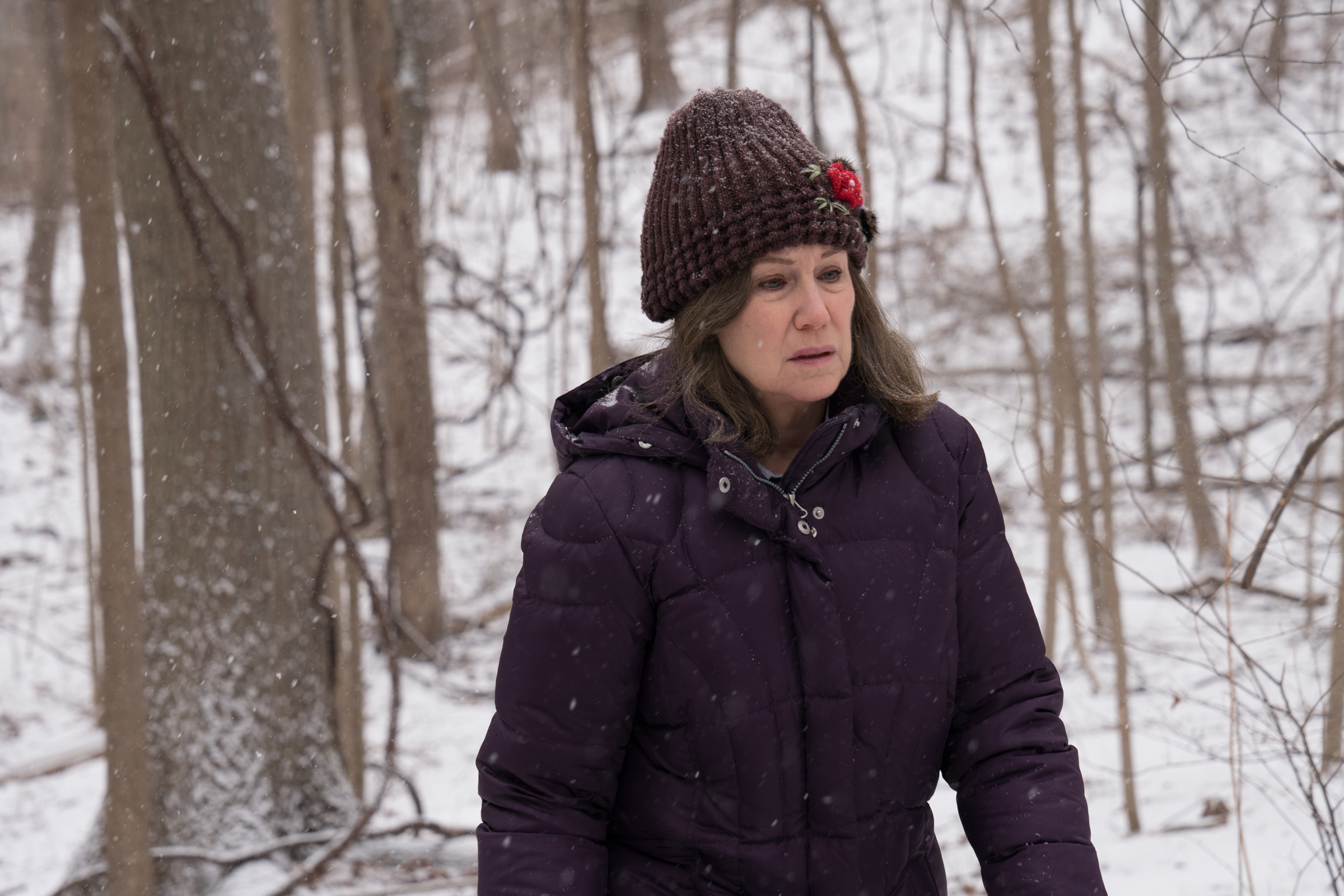Life and death in a small New England town haunt a beleaguered Mary Kay Place in Diane, an assured debut from New York film festival honcho turned feature writer/director Kent Jones, who gives us a doozy of a titular character, a well-meaning caretaker filled with a lifetime of disillusionment. It’s a movie about the aging, or rather aging Baby Boomers facing mortality in a close-knit rural community, and about how life never seems to get any easier, and you may not ever know yourself any better, even in your final days. What if, at the end, it all adds up to very little?
Employing an aesthetic of stark realism, picture opens with aging Massachusetts widow Diane (Place) fulfilling one of many personal daily commitments, this one to the hospital bedside of her acerbic cousin Donna (Deirdre O’Connell), stricken with late-stage cervical cancer. Setting the tone for the rest of the film, an air of death—not particularly tragic, but mostly the cause-and-effect of lives lived—hangs, like a shadow, over every frame.
Diane’s days are largely spent driving the wooded byways from one stop to the next—working in a soup kitchen with her best friend Bobbie (a moving Andrea Martin), checking in with the downtrodden aged and mostly trying to corral her recalcitrant, drug-addicted adult son Brian (Carol’s Jake Lacy, petulant and incendiary) back into rehab. Each day Diane shows up at his squalid doorstep, bringing him clean, folded laundry and stocking his refrigerator, countering his dismissiveness with quiet coaxing toward another stint in recovery, while each day she holds her breath “waiting for the call” that he’s overdosed.
Diane’s respite from these troubles, if there is any, is in her community, and Jones has stacked this extended family and friends with a murderer’s row of great character actors including a brilliant, emphysema-stricken Phyllis Somerville, 70s star Glynnis O’Connor, and the great Estelle Parsons as Diane’s aunt and mother to dying cousin Donna, who believes “God will take care of it.”
Though everyone knows of Diane’s past personal transgressions, including an oft-referred “summer at the Cape” during which a judgement lapse created decades of simmering family resentments—her great support comes from supportive Bobbie, and Martin has two scenes—one in a restaurant where she changes a difficult subject and mood on a dime, and another where she counsels Diane aside at the soup kitchen—that are, in some regards, Diane’s saving grace. At least for a moment.
Jones presents a deeply felt, authentically rendered portrait of community here, a place where everyone knows everyone’s histories, habits and peculiarities (never better than in an early, extended coffee gathering) and it’s worth noting that like Debra Granik’s recent Leave No Trace, he displays a fine ear for the way small-town folks communicate; the values they hold and exactly how, and when, their support systems intervene.
For Diane, there’s real darkness encroaching, her friends passing one-by-one and her inability to assuage dual fears that she’s irreparably damaged her son and that without her constant intervention he’d be dead, or at least like “a baby on a mountaintop.” Diane knows too well that for Brian, tough-love isn’t going to work. And it doesn’t help that everywhere she goes, people ask for an update.
Diane’s nadir comes in a local pub where after a martini or three she tries, half-heartedly, to cut loose, dancing to a jukebox playing Leon Russell’s “Out of the Woods” after which the bartender, whom we assume has known her most of her life, tosses her out.
The picture’s second half offers a few surprises, including Brian’s stark, born again reversal leading to a stinging dinner table confrontation and Diane’s weary understanding that he’s just “traded one thing for another.” The mother and son relationship her couldn’t be better written, and in one of the movie’s best lines, he tells his mother that he “taught himself to disapprove of her.”
Anchoring all of this gorgeous heartbreak is an extraordinary, atypical lead performance from Place, whose in-the-bones-ache is palpable. But she’s also, at times, as caustically funny as she is compassionate, wryly aware that folks see her for what she is, and isn’t. She also isn’t above sarcasm with her ailing cousin, and their decades old bone-to-pick provides one of the film’s edgiest encounters.
Place, the venerable veteran of such pictures as The Big Chill, Smooth Talk, Being John Malkovich and countless more across four decades, as well as cable’s Big Love, is given a meaty role here—perhaps her best and certainly the only feature film lead of her career—and she marvelously creates a woman beaten by life who keeps taking it while compassionately rising to the needs of others.
The third act doesn’t quite sustain the airtight structure and intensity of the first two, and Jones’ decision to spin Diane’s trajectory into a dream or alternate-reality sequence is an unfortunate misstep. Passages of time can also be fuzzy, and the funeral of a key character—a shock to the audience—is rushed through, where it would have benefitted from a bit more introspection.
Ultimately, Diane is about how fast the years pass, how little we change and how we can do even less to change others. It’s also about the baggage we carry that never goes away. And finally, it’s about what’s left when others you have known your entire life are gone. And what about the good times? If your troubles outweigh them, what was the point of it all?
The film ends on a note of bewilderment and transcendence, and perhaps even a reach toward the Divine. It’s sobering stuff, and essential.
3 1/2 stars.



